See our updated post on Marketing Ideas for Real Estate Agents for 2019 here.
Are you looking for killer marketing ideas for real estate agents in 2016? Look no further because we’ve compiled some of the best ideas for you to use in the coming year.
For the last two years, we put together lists of marketing ideas for real estate agents. Check them out because they’re still very applicable today.
Two years ago, our post 7 Marketing Ideas for Real Estate Agents in 2014 showed you how to set up the core elements of a strong, inbound marketing strategy. Last year’s post, 9 Pro Tips: Marketing Ideas for Real Estate Agents in 2015, focused on reducing the amount of time you spend on marketing while still maintaining a strong online presence. Like clockwork, these posts instantly became the most trafficked pages on our site.
This year’s collection of marketing ideas is centered on getting more repeat and referral business from your past clients without creating a lot of work for you.
So without further delay, here are 10 fully-baked marketing ideas for real estate agents in 2016!
1. Centralize and Grow Your Email List
Email marketing is such an important tool for your business for two reasons. First and foremost, unlike social media platforms, it is decentralized, meaning there isn’t one company that owns it. When a crowded network like Facebook needs to reduce the organic reach of your posts to ensure a positive user experience, businesses are the first to feel the reduction. With email, you have a direct line of communication to people you already know.
Secondly, with a robust contact list, you can take the information anywhere and plug it in. Looking to find all your connections on Twitter or LinkedIn? Upload your contact list. Want to run an ad to your clients? Create a target audience on Facebook.
There are plenty of stats to support this notion, but here are a few of our favorite proof points:
- Marketers consistently ranked email as the single most effective tactic for awareness, acquisition, conversion and retention.
- 70 percent of people say they always open emails from the companies they love.
- Email marketing yields an average 4,300 percent return on investment for businesses in the United States.
Why does this all matter? Because every real estate agent we talk to tells us that the majority of their business comes from referrals. In fact, the National Association of Realtors backs this up, reporting that 75 percent of a real estate agent’s business is derived from word-of-mouth and referrals. Thus, keeping in touch with past clients will help keep you top of mind (referrals/repeat business) and having an easy way to contact them is key (we’re looking at you, email).
Takeaway for agents: Start a process now where you keep all your new contacts in a single location. Whether this is your email account, phone, CRM system or a basic spreadsheet, pick a path and stick to it. Then take the time to get your past clients into this system too. (Side note: This is something we do for all of our OutboundEngine customers.) Clean, centralized data on your clients and prospects is one key to marketing longevity across any medium. [Tweet This]
2. Website Lead Capture Forms
Lead generation for real estate agents is a key component to success. With countless search results, links and notifications fighting for your client’s attention, you’ve got to make sure your website is doing its job. One of those jobs is turning website visitors into potential leads by capturing their name, phone number and email address on a form. With this information, you will be able to follow up with said visitor and get a better understanding of what brought them to your site. And why wouldn’t you? If a person is taking the time to visit your page, it’s a safe bet that they’re interested in finding out how your real estate services could benefit them.
We like to think of it like this: Let’s say you run a bakery. A customer walks in to peruse your case and see what’s fresh today. You, being the friendly baker you are, greet that person, ask their name and what you can help them with. And just like that, you’ve started to build a relationship with your customer.
As a real estate agent, you should treat your website visitors the same way a business owner would treat a person who wanders into the shop. Think of your site as the online storefront for the services you offer. And while you can’t walk up to a website visitor and say hello, you can certainly make it simple for that potential client to share their information. That way you have the details you need to follow up appropriately and build that relationship.
This is where website lead capture forms come in. These forms allow you to turn website visitors into leads and use that information to follow up with someone who is already actively seeking you out. Here are a few examples of lead capture forms in action on some websites you might recognize:
The header on Curbed.com gives visitors a “sign up for our newsletter” box to enter an email.

Expensify’s website prompts you to enter your email to get started.
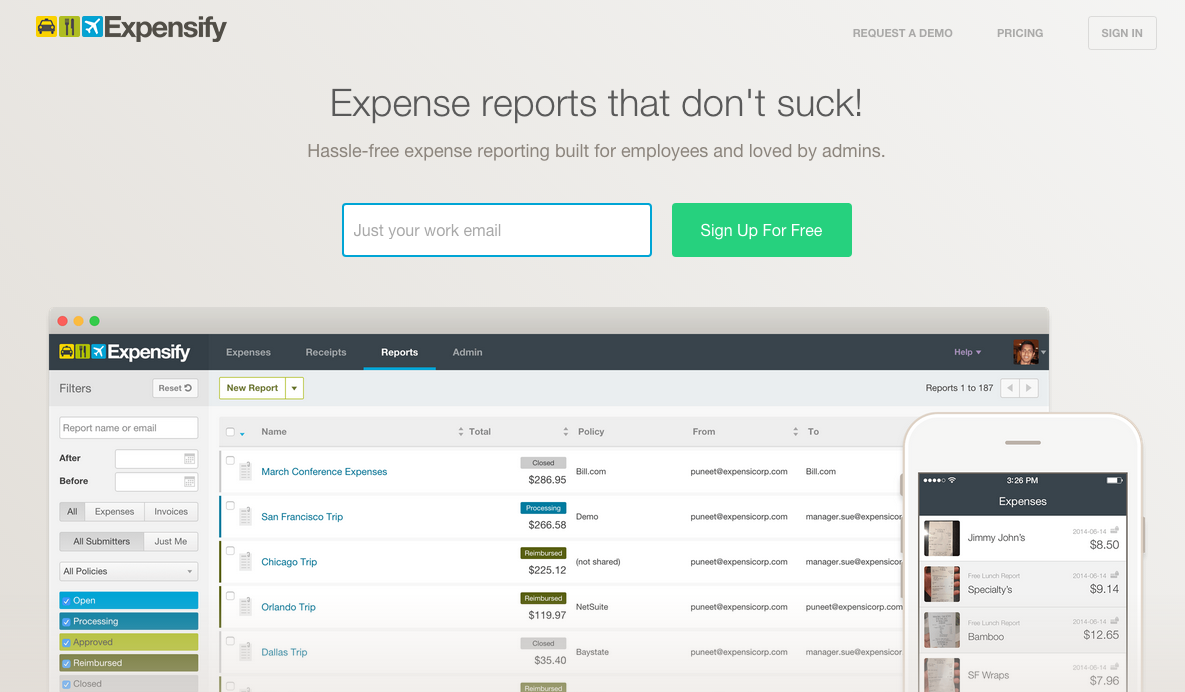
The online profile pages we create for our own customers employ this same lead generation tactic.

Takeaway for agents: Ask for email addresses. If you don’t ask, you won’t get them. Beyond that, it’s up to you to be creative and find what works for you.
3. Build Referral Program
You already know one of the best avenues for securing new business is referrals from your past clients. And that’s backed up by a Nielsen study reporting that 92 percent of people trust earned media, or publicity like recommendations from friends and family, more than all other forms of marketing.
Referral and repeat business make up 82 percent of all transactions for real estate agents. And if that’s not reason enough to set up a referral program, then you should also know that while 91 percent of consumers are willing to give referrals, only 11 percent of salespeople ask for them.
Beyond a verbal ask, you can build referral leads by simply giving clients a place to leave them. If you’re looking to get a referral program set up but aren’t sure where to begin, this 10-step guide is a great resource to get you started. We’ve also put together a done-for-you solution to drive real estate referrals to your inbox: an automated referral campaign program that does the heavy lifting for you. Check it out if you aren’t jazzed about doing it yourself with the guide mentioned above.
Takeaway for agents: Make a conscious effort to initiate referral request conversations in a way that’s not pesky or desperate. If you’re delivering value to your clients, you may be surprised at what they’re willing to reciprocate. Just remember that happy customers are more than willing to help you grow your business, so don’t be afraid to ask for their help. What you’ve heard for so many years is true — sometimes all you’ve gotta do is ask.
4. Get More Reviews
A close friend of referrals and a proven way to spread the word about the services you offer are online reviews. Even after hearing a glowing recommendation directly from a person who had a five-star experience with your agency, there’s a good chance a potential client will still search for reviews to see if that five-star rating checks out. In fact, close to 88 percent of consumers seek out online reviews before making a purchase decision.
Eighty-nine percent of small business owners believe that reviews and reputation management deliver positive ROI, solidifying the importance of having a solid review management strategy in place. You want to not only manage your past and incoming customer reviews, but also actively seek out feedback from your clients via online review sites like Zillow, Yelp and Google+.
You should first make sure that your review pages are claimed and up to date with the information your clients are looking for, including contact information and the services you offer. More often than not, if you didn’t take the time to set up the business page yourself, someone has already added it for you. Take ownership of the page so you have some level of control. Here are a few links to help:
- How to Claim Ownership of Your Business on Yelp
- How to Claim Ownership of Your Business on Facebook
- How to Claim Ownership of Your Business on Google+
Not so different from the way you’d ask a happy client for a referral, you can also ask them to leave a recommendation for you in a review. The next time a client gives you positive feedback via email, phone or in person, mention that you’d appreciate if they would share the same sentiment in an online review. Many clients understand what an important role your online reputation plays in growing your business, and the majority will likely be happy to help you out in that way.
Are your online reviews pages all set up but missing love from your clients? Let’s fix that. Here are the top three things you should be doing to secure online reviews:
- Ask: It’s easy to get discouraged when someone promises an online review but doesn’t follow through. Think of it this way: How many well-intentioned promises have you made over the years that you never followed up on? Everyone forgets. Sometimes a gentle email reminder or a mention in passing conversation is all that’s needed to get the ball rolling again. It never hurts to revisit the ask.
- Incentivize: Good service and a polite ask are usually incentive enough to get online reviews, but we also know that everyone loves a reward, right? If your industry allows it, make online reviews worth your customer’s while! To be clear, we’re not suggesting you offer to pay for positive online reviews. What we’re saying is to have fun with the process. Reward reviewers, both positive and negative, with $5 gift cards from Starbucks or iTunes, or hold a monthly drawing for a $50 Amazon gift card. Whatever you choose to do, it should be easy, fun and tailor-made to your specific audience.
- Respond: If someone leaves you an online review, take the time to thank them. They’ve done you a tremendous favor. Even if the review is negative, you can still thank the reviewer for bringing the problem to your attention and take the opportunity to discuss their concerns, especially those that would worry potential leads. Fifty-three percent of people reported that a message from a company directly to a client positively influences their view of the company. By responding to online reviews and resolving issues in a public forum, you not only nurture existing relationships, but you also build your reputation with potential customers.
Takeaway for agents: People, including qualified referrals, will make assessments of you and your business because of online reviews, even before you have a chance to meet them. This is why generating reviews for your business is so critical. (We can help you with this too.)
5. Get More Email Opens
Looping back to the importance of email marketing, you want to make sure the messages you send are actually being opened. Otherwise, what’s the point? Best practices for email marketing are highly debated, but there are a few things that we’ve found to work really well for real estate agents.
First, let’s talk subject lines. Keep them short (under 50 characters), conversational and don’t be afraid to try something new. Typically, a more casual email subject line has a better chance of catching a reader’s attention. Even if it’s only for a second, that extra consideration may be enough to encourage a curious click, especially if the subject line is relevant.
Here’s how this would work in the real estate industry, for example:
Before: Spruce up Your Home with These Landscaping, Home Repair, and Interior Design Tips
After: Are you interested in landscaping, home repair or interior design?
Choose your words thoughtfully and keep in mind that a customer’s first or last name is the most successful power word you can use in an email newsletter subject line. In fact, personalized email campaigns improve click-through rates by about 14 percent, so embrace personalization when you can.
Takeaway for agents: The first thing a homebuyer sees when it comes to your email marketing efforts is the subject line, so get to the point, write like you talk, and add a personal touch whenever you can.
6. Do-it-for-you
Consider pushing all of these things off your plate and optimizing your marketing efforts at the same time by hiring a full-service online marketing company to handle it for you. Why do it yourself when you could have someone (okay not just someone, but an expert) do it for you? Managing your marketing effectively is a full-time job in and of itself. In fact, the average small business owner spends 20 hours each week on marketing. It’s easy to understand why so much time is being spent on marketing when 75 percent of small businesses say that Internet marketing brings customers in the door.
But with so much weight being placed on the value of online marketing for small businesses, why are 34 percent of small business owners allocating less than 10 percent of their marketing budget to online channels?
Maybe it has to do with the premium prices most third-party marketing firms charge small business owners for solutions that don’t quite meet their needs. It’s just not in the budget, and it doesn’t do the trick. But it doesn’t have to be that way. We understand that every dollar and minute matters for real estate agents. That’s why we offer an affordable, done-for-you email and social media marketing solution that’s customized to meet your needs.
Takeaway for agents: What would 20 extra hours in the week mean for you? Of course, you can buckle down and do it all yourself, but to avoid these common pitfalls and free up a whole lot of time, why not consider letting a team of dedicated team of online marketing experts do it for you?
7. Instagram
With over 400 million active users, Instagram is proving to be a useful marketing tool for real estate agents. What started out as a simple app to share photos and follow family and friends has turned into a marketing opportunity and a necessary part of the social strategy mix for real estate agents.
And it’s not just the images that make this app useful. Instagram lets users geotag their photos to a specific location, which can be especially beneficial for location-based businesses like real estate. A geotagged photo features the location of the photo above an image and creates a photo map of all geotagged posts in that area. If you have a lot of listings in a certain part of town, you can pinpoint those properties by simply geotagging the neighborhood you’re in.
You can see how not only agents but major real estate companies are using Instagram to engage homebuyers, showcase properties and connect with local communities.
This is a geotagged post we found on Instagram by searching “Travis Heights” (a popular neighborhood in Austin, TX) on Instagram.

HouseConnect features a variety of interior and exterior shots that show off a property.

RemaxMalibu focuses on networking, home showings and a coastal lifestyle.

As you can see, there are plenty of opportunities to get creative with your real estate Instagram account and tailor your posts to the type of clientele you want to attract. Instagram is not only useful but also simple to use and a lot of fun.
If you’ve never played around with Instagram before, follow this Instagram for Business guide we’ve put together to get your account up and running in a few easy steps. If you’re looking for more examples of how real estate agents are using Instagram to give a behind-the-scenes look at their business, you might enjoy this post.
Takeaway for agents: Forget what your nephew told you; Instagram is for more than selfies and food pics. It’s a fantastic app that will keep you in the news feeds of clients and give you a chance to showcase your unique personality and your listings in a lighthearted way.
8. LinkedIn Long-Form
As a real estate agent, you no doubt understand the value of using LinkedIn as a networking tool, but did you know that it’s also a great channel to showcase your industry expertise? The LinkedIn long-form posting feature lets users write and publish their own original content to be featured across the site through its curated news feed, Pulse.
Publishing original content is a great way to get exposure for yourself and your business, but without an active audience, your work has a short lifespan. With Pulse, you’re piggybacking on the world’s largest professional social network (more than 380 million users), giving you instant access to an active audience of content consumers.
Takeaway for agents: When you write and share your own original content on LinkedIn’s Pulse, you give yourself an instant leg up on the competition. It takes a long time to build an audience of followers, but with Pulse, your voice is added to a network of individuals who are already tuned in. This strategy can get you noticed as an expert in your field and boost your professionalism.
9. Facebook Ads
Facebook ads are an inexpensive and effective way to grow your audience, get your posts seen more often and increase engagement with the content you’re posting. Facebook designed its ad tools to be easily understandable by users of all experience backgrounds. But most important of all, the ad platform is designed to help you achieve a specific end goal, such as more likes, increased web traffic and downloads.
Facebook has done a remarkable job guiding users through the ad creation process, making your desired results the primary objective. The first question the Facebook ad platform asks you is, “What is your objective?” The platform removes the guesswork from what you’re trying to accomplish with your ad.
Bonus Content: Get started with our State of Social guide.
Takeaway for agents: Facebook is still free for businesses to use. And while that should be a primary component of your marketing plan, remember that the news feed is getting even more crowded, meaning less organic visibility for your posts. Facebook wants your business to succeed, which is why they’ve built such a robust ad platform to help you do just that.
10. Retargeting
What is retargeting? Retargeting converts window shoppers into buyers, which AdRoll explains in a more simplified form. It’s a strategy that works by keeping track of people who visit your site and displaying your retargeting ads to them as they visit other sites online. Retargeting is most effective if you segment your visitors (for example, people who looked at condos vs. family homes) and tailor your retargeting ads to each group.
There’s about a two-week window when consumers research homebuying-related activities, be it for listings, movers or school districts. In that time, they may visit your site, but only 2 percent will actually “convert,” or contact you. You need to encourage the other 98 percent to come back. Adwerx does an excellent job of breaking it down.
If you’re ready to get into more advanced real estate marketing tactics, you can test this out. We dive into a bit more detail on retargeting in our Beyond the Basics Guide to online marketing, with some specific takeaways geared toward retargeting on Facebook.
Takeaway for agents: Work retargeting into your real estate marketing mix to help convert potential homebuyers who visit your website into clients. If you’re experienced with ad targeting, you can do this yourself. Alternatively, use outside services like those listed in this post to get things rolling for you.
Wrap-Up
Feeling ready for 2016? You should be. With these fresh real estate marketing strategies, you’re positioned for a great start to the new year.
We know there’s a lot of different information out there regarding how to best market your business and frankly, it can get overwhelming. The ideas and resources in this post are intended to give you a jumping off point and head-start for 2016. Try these ideas, monitor your results, and if you ever need a little help, we’ll always be here to lend a helping hand.

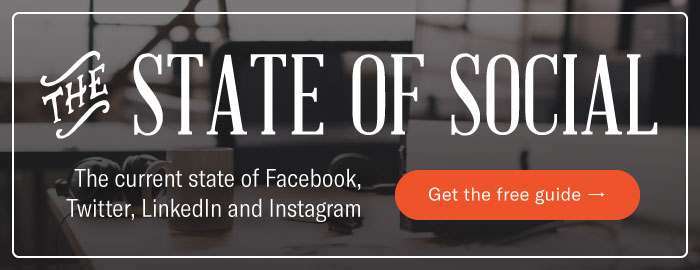
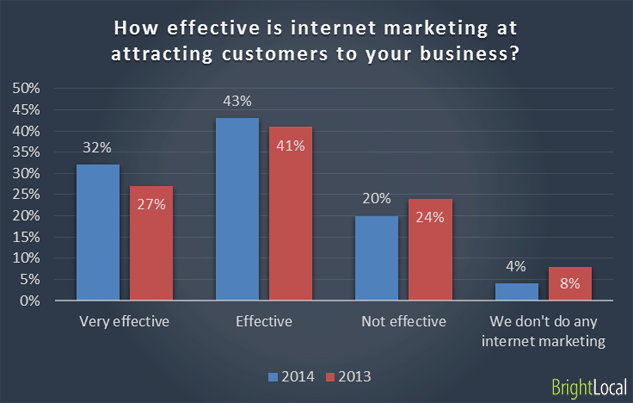
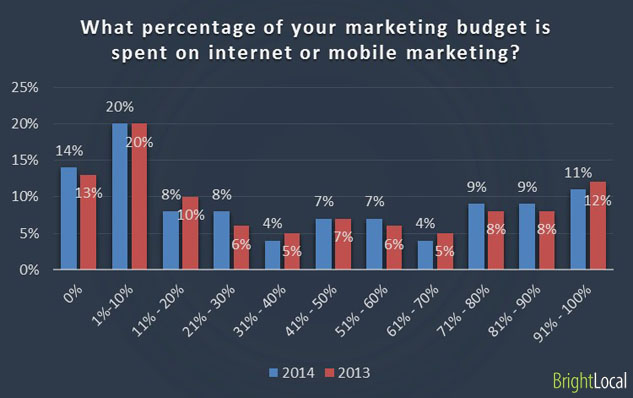
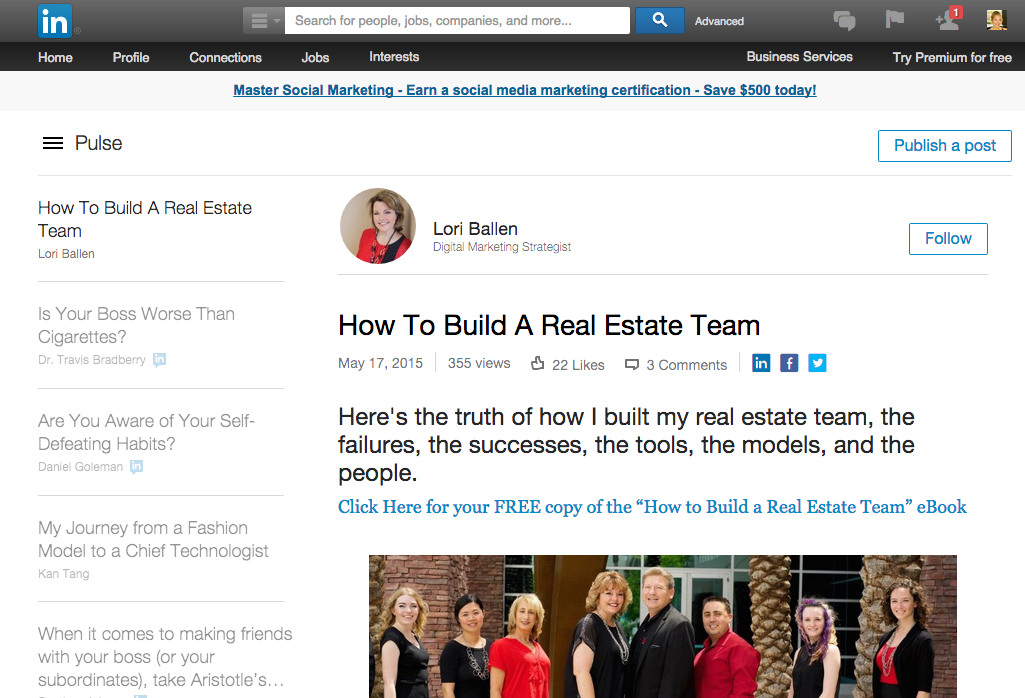
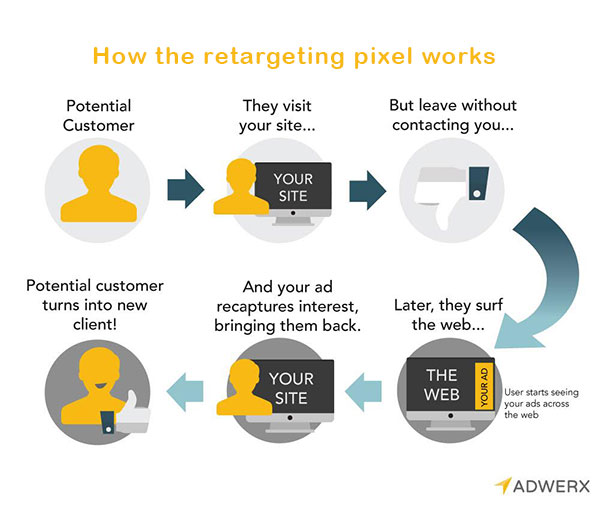

![Better Email Etiquette Equals Better Marketing Results [16 Rules]](https://www.outboundengine.com/wp-content/uploads/shutterstock_411184843-1-400x250.jpg)

